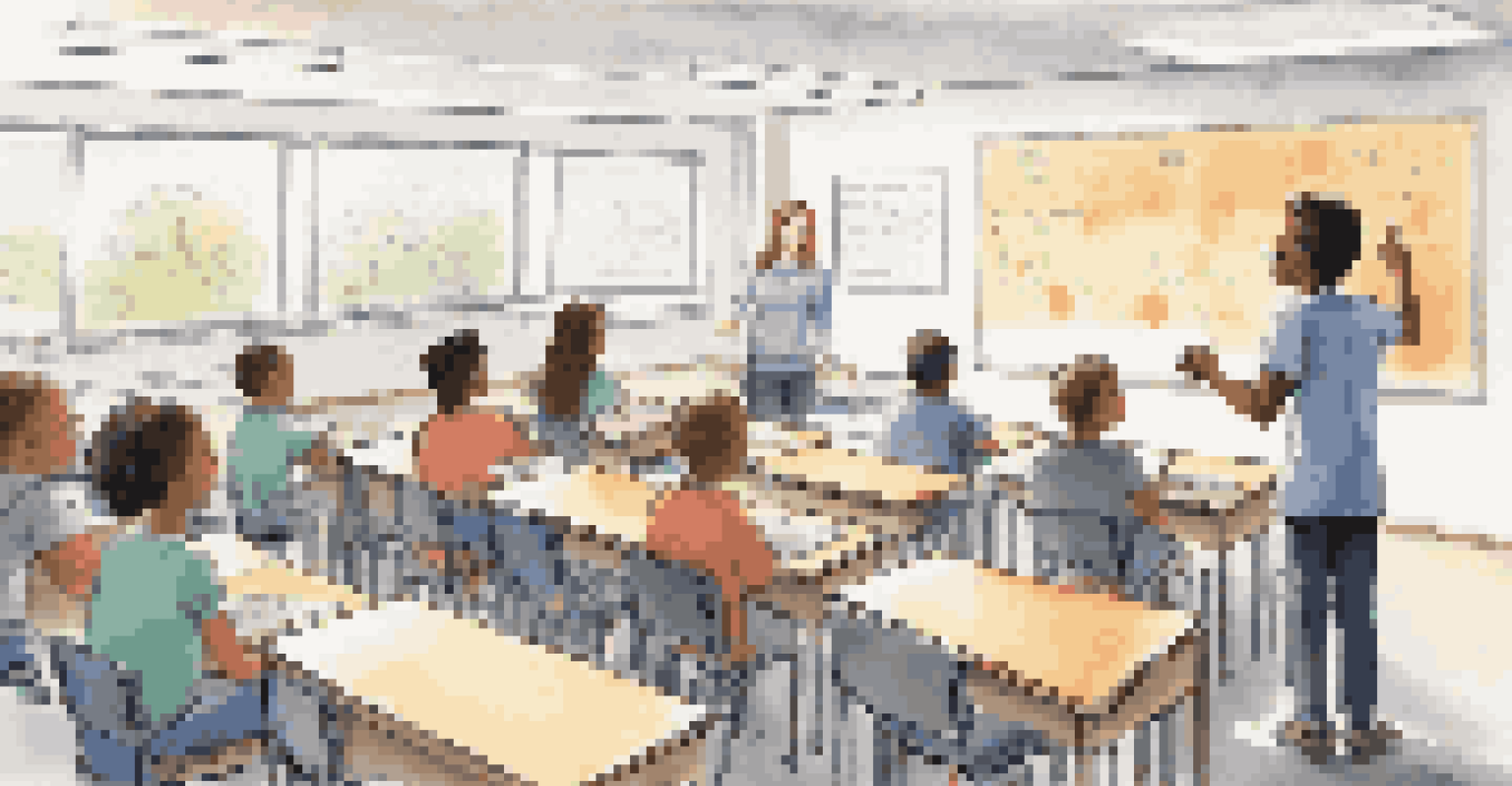Exploring the Benefits of Peer-to-Peer Feedback in Assessments

Understanding Peer-to-Peer Feedback and Its Importance
Peer-to-peer feedback involves students reviewing and commenting on each other's work. This collaborative approach fosters a sense of community and encourages open dialogue among learners. By engaging in this practice, students can gain diverse perspectives that enhance their understanding of the subject matter.
Feedback is the breakfast of champions.
Moreover, peer feedback promotes critical thinking skills. When students assess their peers' work, they must analyze and evaluate content, which deepens their comprehension. This process not only benefits the reviewer but also helps the recipient improve through constructive criticism.
Ultimately, incorporating peer feedback into assessments can lead to higher engagement levels. Students often feel more comfortable receiving feedback from their peers, leading to a more supportive learning environment. This encourages them to take an active role in their education.
Building a Collaborative Learning Environment
One of the most significant advantages of peer feedback is the sense of collaboration it fosters. Students learn to work together, share knowledge, and support each other's growth. This communal approach makes learning more enjoyable and less isolating, particularly in remote or online settings.

Additionally, collaboration allows students to develop essential interpersonal skills. As they communicate and provide feedback, they practice empathy and respect for different viewpoints. These soft skills are invaluable, as they prepare students for future workplace dynamics.
Peer Feedback Enhances Learning
Peer-to-peer feedback fosters collaboration and critical thinking, enriching the educational experience.
A collaborative learning environment also encourages accountability. When students know their peers are reviewing their work, they may be more motivated to put in their best effort. This shared responsibility creates a culture of excellence and encourages continuous improvement.
Enhancing Critical Thinking Skills Through Feedback
Engaging in peer feedback helps students sharpen their critical thinking abilities. By analyzing their peers' work, they learn to identify strengths and weaknesses, encouraging a more profound understanding of the subject. This analytical process is crucial for developing problem-solving skills.
We learn from our mistakes, but we learn even more from the mistakes of others.
For example, when students critique an essay, they must consider various elements such as structure, argumentation, and evidence. This comprehensive evaluation not only boosts their analytical skills but also enhances their own writing when they apply the insights gained from reviewing others.
Furthermore, critical thinking nurtured through peer feedback extends beyond the classroom. These skills are transferrable to real-world scenarios, enabling students to approach challenges with a more reflective and informed mindset.
Promoting Self-Reflection and Personal Growth
Peer feedback encourages self-reflection, a vital component of personal growth. When students receive feedback, they are prompted to evaluate their work and consider areas for improvement. This introspective process fosters a mindset geared towards continuous learning.
For instance, a student might realize that they struggle with specific aspects of their writing after receiving critiques. This awareness allows them to focus on those areas and seek additional resources or practice, ultimately enhancing their skills.
Collaboration Builds Essential Skills
Engaging in peer feedback helps students develop vital interpersonal and communication skills necessary for future success.
Moreover, self-reflection through peer feedback cultivates resilience. Students learn to accept constructive criticism and view it as an opportunity for growth rather than a personal affront. This shift in perspective is essential for developing a growth mindset.
Fostering Communication Skills in Students
Participating in peer feedback sessions helps students enhance their communication skills significantly. They learn how to articulate their thoughts clearly and provide constructive criticism in a respectful manner. This practice is essential for effective collaboration and teamwork.
Additionally, students must navigate differing opinions and ideas during feedback exchanges. This experience teaches them how to engage in meaningful discussions, disagree respectfully, and find common ground. Such skills are crucial in both academic and professional settings.
Furthermore, effective communication fosters a sense of belonging in the classroom. When students feel comfortable sharing their thoughts, they are more likely to contribute actively to discussions and engage with the material. This engagement leads to a richer learning experience.
Creating a Safe Space for Feedback and Growth
Establishing a safe environment for peer feedback is essential for maximizing its benefits. Students need to feel secure in sharing their work and opinions without fear of harsh judgment. Instructors can facilitate this by setting clear guidelines and emphasizing the importance of constructive feedback.
When students trust that their peers will provide thoughtful insights, they are more likely to open up and engage in the process. This trust fosters a supportive atmosphere where everyone is encouraged to learn and grow together.
Creating a Supportive Feedback Culture
Establishing a safe environment for feedback encourages open dialogue, emotional intelligence, and personal growth among students.
Moreover, a safe space for feedback helps students develop emotional intelligence. They learn to navigate their feelings about receiving criticism and understand the impact of their words on others. This emotional awareness is key to building strong relationships and effective communication.
Measuring the Impact of Peer-to-Peer Feedback
To fully understand the benefits of peer-to-peer feedback, it's essential to measure its impact on student learning. Educators can gather data through surveys, performance assessments, and reflective journals. This data can provide valuable insights into how peer feedback influences academic outcomes.
For example, comparing student performance before and after implementing peer feedback can reveal significant improvements. Tracking engagement levels and attitudes towards learning can also help educators refine their approaches and better support their students.

Ultimately, measuring the impact of peer feedback not only validates its effectiveness but also informs future practices. Educators can make data-driven decisions to enhance learning experiences and foster a culture of continuous improvement.